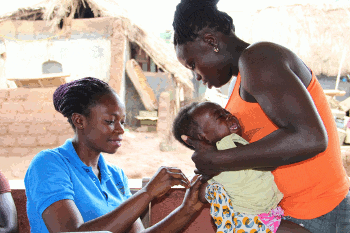Issue Spotlight: Ghana's National Health Insurance Scheme
Ghana’s National Health Insurance Scheme (NHIS) began in 2003 with the idea of providing financial risk protection against the cost of quality of basic health care. The health scheme is operational in 155 districts throughout the country, the government says (PDF), representing 8.8 million people, or roughly 35 percent of the population.
National health insurance plans falls under a World Health Organization promotion for Universal Health Coverage. “Without financial risk protection in health – the assurance that they will not suffer severe financial problems if they need to use health services – people will defer seeking care or not seek it at all,” per the WHO.(PDF)
How effective is Ghana’s health plan? The HRH Global Resource Center recently posted a few studies investigating the NHIS from different angles.
- Social Deterministic Factors to Participation in the National Health Insurance Scheme in the Context of Rural Ghanaian Setting
- Ghana's National Health Insurance Scheme in the Context of the Health MDGs - An Empirical Evaluation Using Propensity Score Matching
- Does the Design and Implementation of Proven Innovations for Delivering Basic Primary Health Care Services in Rural Communities Fit the Urban Setting: The Case of Ghana’s Community-based Health Planning and Services (CHPS)
- Human Resources for Health and Universal Health Coverage: Fostering Equity and Effective Coverage
[This includes an investigation of Ghana’s plan, along with those from three other countries.] - Household perceptions and their implications for enrollment in the National Health Insurance Scheme in Ghana
For additional resources on national health plans, visit the National Policy subject category. For more information on Ghana, please visit the country page.
Past Resource Spotlights
- 799 reads





